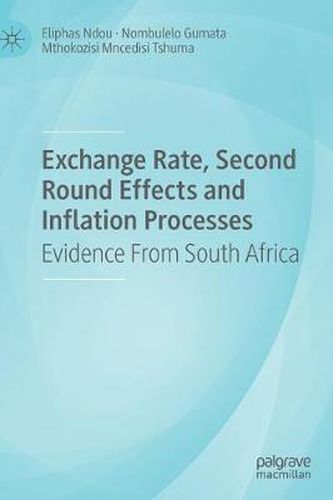Readings Newsletter
Become a Readings Member to make your shopping experience even easier.
Sign in or sign up for free!
You’re not far away from qualifying for FREE standard shipping within Australia
You’ve qualified for FREE standard shipping within Australia
The cart is loading…






This title is printed to order. This book may have been self-published. If so, we cannot guarantee the quality of the content. In the main most books will have gone through the editing process however some may not. We therefore suggest that you be aware of this before ordering this book. If in doubt check either the author or publisher’s details as we are unable to accept any returns unless they are faulty. Please contact us if you have any questions.
This book focuses on the exchange rate pass-through (ERPT), second round effects and the inflation process in South Africa. The authors demonstrate that magnitudes of the second round effects of the exchange rate depreciation and oil price shocks depend on inflation regimes. The impact of positive oil price shocks on inflation is weakened by monetary policy credibility. Evidence shows the influence of oil price on unit labour costs and correlation between exchange rate changes and inflation has weakened. In addition, ERPT is reduced by low business and consumer confidence, high trade openness, low inflation and high exchange rate volatility which weaken real economic activity. Both monetary and fiscal policy credibility lowers the sizes of ERPT to inflation and inflation expectations. Fiscal policy via fuel levies, administered prices and public transport inflation channel impacts the responses of monetary policy to inflation shocks. The authors show that second round effects contribute very little to wage inflation following an exchange rate depreciation shock. Both lending rate and household consumption responds asymmetrical to repo rate changes.
This book will appeal to policymakers, students, academics and analysts.
$9.00 standard shipping within Australia
FREE standard shipping within Australia for orders over $100.00
Express & International shipping calculated at checkout
Stock availability can be subject to change without notice. We recommend calling the shop or contacting our online team to check availability of low stock items. Please see our Shopping Online page for more details.
This title is printed to order. This book may have been self-published. If so, we cannot guarantee the quality of the content. In the main most books will have gone through the editing process however some may not. We therefore suggest that you be aware of this before ordering this book. If in doubt check either the author or publisher’s details as we are unable to accept any returns unless they are faulty. Please contact us if you have any questions.
This book focuses on the exchange rate pass-through (ERPT), second round effects and the inflation process in South Africa. The authors demonstrate that magnitudes of the second round effects of the exchange rate depreciation and oil price shocks depend on inflation regimes. The impact of positive oil price shocks on inflation is weakened by monetary policy credibility. Evidence shows the influence of oil price on unit labour costs and correlation between exchange rate changes and inflation has weakened. In addition, ERPT is reduced by low business and consumer confidence, high trade openness, low inflation and high exchange rate volatility which weaken real economic activity. Both monetary and fiscal policy credibility lowers the sizes of ERPT to inflation and inflation expectations. Fiscal policy via fuel levies, administered prices and public transport inflation channel impacts the responses of monetary policy to inflation shocks. The authors show that second round effects contribute very little to wage inflation following an exchange rate depreciation shock. Both lending rate and household consumption responds asymmetrical to repo rate changes.
This book will appeal to policymakers, students, academics and analysts.